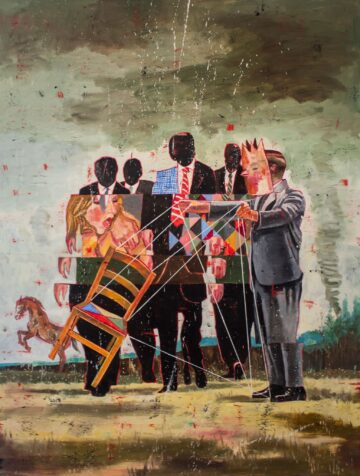
Originally published in The Voice of San Francisco in September 2024
The Yerba Buena Center for the Arts presents exhibits by two artists offering a moving and discerning examination of the fight for free expression. Iranian-American artists Nicky Nodjoumi and Nahid Hagigat explore the dynamics of power in their paintings which also touch on everyday life and personal heritage.
A Family’s Political Struggles that Shaped Art
Born in Iran, Nicky Nodjoumi and Nahid Hagigat met while studying art New York, NY where the two had both attended art school. They married and had a child, then Nodjoumi returned to Tehran where a series of events born from a single exhibition changed his life and the life of his family forever.
Interconnected Solo Exhibitions with a Shared Message
In The Personal is Political, Nodjoumi’s figurative paintings created over the last 15 years function as theatrical stages where the serious and ridiculous are brought together, engaging in political discourse and reiterating his staunch commitment to democracy. His brush strokes, palette and overall style show the influence of his art studies in New York during the sixties and seventies, and his experiences in Iran and the United States create scenes that resonate beyond personal history and allude to the collective experience of socio-political turmoil, transforming the biographical into the universal.
Etched in Time is an evocative selection of Nahid Hagigat’s paintings, prints and etchings spanning six decades. Portraying female Iranian figures through a feminist lens, she explores identity and the constraints of politics and societal ideologies on women. Among the artworks is a series from the 1970’s inspired by photographs sent to Hagigat in New York by her sister in Tehran. Drawing on these images of women and children in everyday life, figures are often rendered in multiples and with bright colors reminiscent of pop art. This repetition weaves together complex stories that move seamlessly between the personal and the global.
Both Hagigat and Nodjoumi’s practices offer a unique reflection on adversity, power imbalances and ultimately a search for home. Both exhibitions will be framed by an introductory gallery featuring family photos and archival material, which shed light on the personal and shared challenges that informed their creative practices. Also included is a previously unexhibited 1972 animation by Nodjoumi that probes issues that continue to burden global communities to this day.
A Revolution on Canvas
On view October 5, 2024 through February 23, 2025, the exhibition will be presented alongside monthly screenings of the film A Revolution on Canvas, an HBO documentary produced by Nodjoumi and Hagigat’s daughter Sara Nodjoumi and her partner Till Schauder, which inspired the premise for this exhibition. The film begins with the investigation of the disappearance of 120 of Nodjoumi’s artworks in Tehran after his 1980 exhibition. Nodjoumi’s involvement in the revolution and his depiction of the events that unfolded showed up in the subject matter of his figurative canvases: the violence and abuses of power he witnessed during that time amounted to a historic document of the upheaval in Iran. The impact of these bold canvases resulted in his exile from his native country. Through the attempt to recover the paintings, the story unfolds and exposes the family’s history and the indelible impact of politics on their lives.
“These two exhibitions invite us to reflect on the role of artists and the power of creative expression, especially during times of political upheaval,” said Curator Amy Kisch. “How do their voices ground us in our shared humanity? What are the sacrifices they make and the impact across generations? How do we support legacies of creativity and free expression? Both Nodjoumi and Hagigat have inspired generations of artists who have followed them, and this show pays tribute to their incredible legacy, and their commitment to art and democracy—even under times of great duress.”